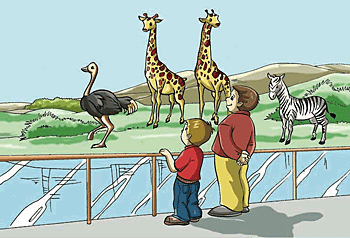2. A facility, as a park or an institution, in which living animals, also wild ones, are housed and exhibited to the public: A zoological garden can be further explained as a place where animals are restricted within artificial environments besides being exhibited to the public.
The first zoos were private menageries, usually belonging to monarchs.
King Charles I, of England, established a zoo with a large python as the main attraction.
The first public zoo was established in Vienna in 1752, when the Habsburg emperors decided to grant public access to the former privately-owned Schönbrunn Palace menagerie, now called "Tiergarten Schönbrunn". After the French Revolution, the Paris Zoo was opened to the public.
Since those early times, the mission of zoos has shifted from simply displaying animals for the wonderment of the public, to scientific study, and later, to breeding them, and in particular to maintain populations of animals that are endangered or even extinct in the wild.
The first scientific zoological garden in the modern world was founded in London in 1828 by the Zoological Society of London.
It was opened to the public in 1847, as a way of funding its scientific work. Londoners soon shortened zoological gardens to "zoo".
It was the Zoological Society of London, too, which was to be the first to create an open wild animal park, with the establishment of the Whipsnade Wild Animal Park on the Chiltern Hills in 1926.

